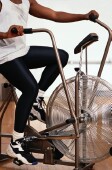- 8 Ways to Increase Dopamine Naturally
- 7 Best Breads for Maintaining Stable Blood Sugar
- Gelatin vs. Collagen: Which is Best for Skin, Nails, and Joints?
- The Long-Term Effects of Daily Turmeric Supplements on Liver Health
- Could Your Grocery Store Meat Be Causing Recurring UTIs?
- Are You Making This Expensive Thermostat Error This Winter?
- Recognizing the Signs of Hypothyroidism
- 10 Strategies to Overcome Insomnia
- Could Artificial Sweeteners Be Aging the Brain Faster?
- Techniques for Soothing Your Nervous System
Study Probes Why Exercise Leaves Women More Breathless Than Men


FRIDAY, Nov. 8It’s widely known that women find it harder to breathe during exercise than men of a similar age — even among those with heart and lung disease. And now researchers say they’ve discovered why.
A new study says women have more severe shortness of breath than men during exercise due to greater electrical activation of their breathing muscles.
The research, published Nov. 8 in the journal Experimental Physiology, is the first to explain why this happens, the study authors said.
Canadian researchers looked at 50 healthy, nonsmoking men and women aged 20 to 40. The study participants worked out on a stationary bicycle while their heart, lung and other body functions were monitored. At regular intervals during the workout, the participants rated their levels of breathlessness.
“Our findings indicated that greater electrical activation of the respiratory muscles during exercise in women is needed to compensate for their smaller lungs, airways and breathing muscles,” study leader Dr. Dennis Jensen, of McGill University in Montreal, said in a journal news release.
The authors said the findings could aid researchers and health care providers in identifying new methods of improving the symptoms of breathlessness and boosting exercise capacity among groups including seniors and people with chronic heart and lung disease.
Additional research is required to determine if these findings also are true in other groups of men and women, such as those who are overweight or obese, Jensen said.
More information
The U.S. Office on Women’s Health has more about exercise.
Source: HealthDay
Copyright © 2026 HealthDay. All rights reserved.










